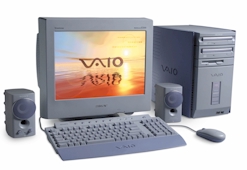|
|


TechnoFILE is copyright and a registered trademark © ® of
Pandemonium Productions.
All rights reserved.
E-mail us Here!

Sony PC a Desktop StudioBy Jim Bray Sony's VAIO Digital Studio is a desktop computer with a decidedly video bent. On one hand it's a pretty standard PC with enough horsepower to run your home or business, but on the other hand it's also a functional home entertainment and video production center. The $1799 VAIO Digital Studio PC, AKA model PCV-R556DS, sports an Intel Pentium III processor that zips along at 733 Megahertz. It comes with 128 MB of SDRAM, expandable to 256 MB, and a 30 GB Ultra ATA-66 Hard Drive. Optical storage includes a 16x DVD-ROM/40x CD-ROM drive, and an 8x CD-R/4xCD-RW/32xCD-ROM “burner.” The video card is “smarter than the average bear,” which befits the Vaio’s video editing pedigree. It's a 2X AGP 3D (nVidia Riva TNT 2 Pro with 16 MB Video Memory (SDRAM). Other hardware includes a V.90 Modem and a 10/100Base-T Ethernet port for hooking the Vaio into your network or high speed Internet connection – and to ultimately prove the PC’s video creation heritage there’s also a pair of I-link “Firewire” connectors (one six pin and one four pin) for hooking in your DVcam or whatever other peripheral you have that uses such a hookup. There is also the usual crop of “normal” I/O’s, including three USB ports (one’s mounted on the front panel), parallel, serial, etc. In all, that makes for a pretty complete PC – and that’s only the hardware. Sony also bundles enough software to keep you happily computing for the foreseeable future. Prime among these is Sony's new MovieShaker digital video editing software and DVgate digital video software, the stuff that gets your shots or footage into the Vaio and then lets you wreak your own type of personal havoc onto it. MovieShaker is an almost no brainer software package for creating your personal movies. It uses a simple “point and click and/or drag” interface to let you import your video clips and put them together, complete with transitions, background music and titles. Its ease of use reminds me of programs like MGI’s VideoWave family. MovieShaker breaks the home-movie making process into three parts. The first one is to get your footage into the PC, of course, which is easy with the Vaio’s two I-Link IEEE-1394 ports. Once you've done that, you can choose from five MovieShaker “themes” (ranging from "Romantic" to "Exciting") then, when everything’s ready to go, click on the "Shake" icon and sit back while the software rustles up your finished "film" complete with transitions, special effects and music based on the theme you chose. This isn't the way Steven Spielberg does it, but it's certainly a simple solution. If you're more gutsy, MovieShaker also lets you re-arrange scenes, insert customized text and audio, and select appropriate transitions on your own. Your finished product can be output in various formats, from a compressed e-mail attachment to the high-quality DV format. You can also store it onto a CD-R disc. If you want to try biting off even more, Sony throws in Adobe Premiere LE video editing software. Then there’s DVgate Motion and DVgate Still, which are Sony applications for capturing full motion digital video and still photographs. Sony's PictureGear software, a “digital content manager,” is also thrown in. You can use it to visually organize and manage still images, digital video clips, MP3 files, etc. There’s more, too, like Sony Media Bar, which I initially thought was a place for journalists to go drinking. As it turn out, it's just an audio/video “entertainment center” that controls CD/DVD/MD software. Speaking of software, the Vaio comes with Windows 98 SE installed, as well as a pretty complete package of apps, including MS Word 2000 (though you'd think they'd throw in the entire Office suite), CD creation software from Adaptec, and McAfee VirusScan. A nifty Vaio demo shows you all the neat video-related things you can do with the PC. I didn't think much of the Sony keyboard; it offer a very good typing feel, which could be an important consideration for many people. Likewise, I couldn't get the wheel mouse to scroll across the contents of Explorer Windows. One thing I really did like was the unit’s extremely quiet fan, something I wish all PC’s would adopt. In all, the Sony Vaio PCV-R556DS is a nicely thought out unit that does a good job at what its designers intended. Jim Bray's technology columns are distributed by the TechnoFILE and Mochila Syndicates. Copyright Jim Bray.
|
|
|
|
|
| Support TechnoFile via Paypal |
| TechnoFILE's
E-letter We're pleased to offer our FREE private, subscription-based private E-mail service. It's the "no brainer" way to keep informed. Our Privacy Policy |